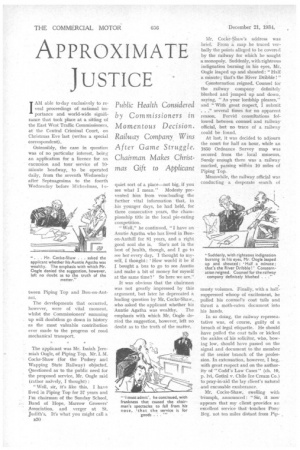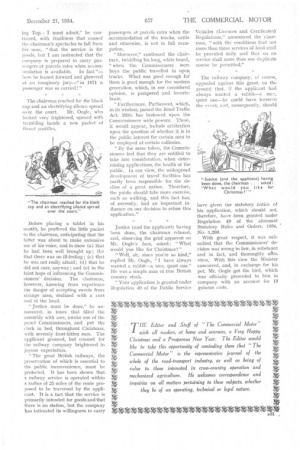APPROXIMATE JUSTICE
Page 44

Page 45

If you've noticed an error in this article please click here to report it so we can fix it.
IAM able to-day exclusively to reveal proceedings of national importance and world-wide significance that took place at a sitting of the East West Traffic Commissioners, at the Central Criminal Court, on Christmas Eve last (writes a special correspondent).
Ostensibly, the case in question was of no particular interest, being an application for a licence for an excursion and tour service of TOM:Mute headway, to be operated daily, from the seventh Wednesday after Septuagesima, to the fourth Wednesday before Mfch7elmas, tween Piping Top and Buis-on-Antnth.
The developments that occurred, however, were of vital moment, whilst the Commissioners' summing up will doubtless go down in history as the most valuable contribution ever made to the progress of road mechanical transport.
The applicant was Mr. Isaiah Jeremiah Oogle, of Piping Top. Mr. I. M.
Cocke-Shaw (for the Pudsey and Wapping State Railway) objected. Questioned as to the public need for the proposed service, Mr. Oogle said (rather naively, I thought) "Well, sir, it's like this. I have lived in Piping Top for 57 years and I'm chairman of the Sunday School, Band of Hope, Marrow Growers' Association, and verger at • St. Judith's, It's what you might call a u30 quiet sort of a. place—not big, if you set what I mean." Modesty prevented him from vouchsafing the further vital information that, in Isis younger days, he had held, for three consecutive years, the championship title in the local pie-eating competition .
" Well," he continued, "I have an Auntie Agatha who has lived in Bunon-Anthill for Si years, and a right good soul she is. She's not in the best of _health, though, and I go to see her every day. -I thought to myself, I thought: 'How would it be if I bought a bus to go to see Auntie and make a bit of money for myself at the same time?' So here we are,"
It was obvious that the chairman was not greatly impressed by this argument, but later he deprecated a leading question by Mr. Cocke-Shaw, who asked the applicant whether his Auntie Agatha was wealthy. The emphasis with which Mr. Oogle deniad the suggestion, however, left no doubt as to the truth of the matter. Mr. Cocke-Shaw's address was .brief. From a snap he traced verbally the points alleged to be covered by the railway for which he sought a monopoly. Suddenly, with righteous indignation burning in his eyes, Mr. Oogle leaped up and shouted: "Half a minute ; that's the River Dribble !"
Consternation reigned. Counsel for the railway company definitely blushed and jumped up and down. saying, "As your lordship pleases," and With great respect, I submit . ." several times for no apparent reason. Fervid consultations followed between counsel and railway official, but no trace of a railway could be found.
At last, it was decided to adjourn the court for half an hour, while an 1850 Ordnance Survey map was secured from the local museum. Surely enough there was a railway marked, passing Within 10 miles of Piping Top.
Meanwhile, the railway official was conducting a desperate search of musty volumes. Finally, with a halfsuppressed whoop of excitement, he pulled his counsel's coat tails and thrust a moth-eaten document into his hands.
In so doing, the railway representative was, of course, guilty of a breach of legal etiquette. He should have pulled the coat tails or kicked the ankles of his solicitor, who, bowing low, should have passed on the signal and document to the member of the senior branch of the profession. In extenuation, however, I beg, with great respect and on the authority of "Codd's Law Cases" (ch. 10, p. lvi, Gotini v. Chile Ice Cream Co.) to pray-in-aid the lay client's natural and excusable exuberance.
Mr. Cocke-Shaw, swelling with triumph, announced: "Sir, it now appears that my client -provides an excellent service that touches Pony Bog, not ten miles distant from Pip ing Top. • I must admit," he continued, with frankness that caused the chairman's spectacles to fall from his nose, "that the service is for goods, but I am instructed that the company is prepared to carry passengers at parcels rates when accommodation is available. In fact "— here he leaned forward and glowered at an imaginary jury—" in 1871 a passenger was so carried!"
The chairman reached for the black cap and an electrifying silence spread over the court. Mr. Oogle, who looked very frightened, opened with trembling hands a new packet of throat pastilles.
Before placing a • tablet in his month, he proffered the little packet to the chairman, anticipating that the latter was about to make extensive use of his voice, and to show (a) that lie had been well brought up ; that there was no ill-feeling ; (c) that he was not really afraid; (d) that be did not care, anyway; and (e) in the faint hope of influencing the Commissioners' decision. The chairman, however, knowing from experience the danger of accepting sweets from strange men, declined with a curt nod of the head.
"Justice must be done," he announced, in tones that filled the assembly with awe, awoke one of the panel Commissioners, and put the clerk in bed, throughout Christmas, with severely frost-bitten ears. The applicant groaned, but counsel for the railway company brightened in joyous expectation.
"The great British railways, the preservation of which is essential to the, public inconvenience, must be protected. It has been shown that a railway service is operated within a radius of 25 miles of the route proposed to be traversed by the applicant. It is a fact that the service is primarily intended for goods and that there is no station, but the company 'has intimated its willingness to carry
passengers at parcels rates when the accommodation of the trucks, cattle and otherwise, is not in full occupation.
"Moreover," continued the chairman, twiddling his long, white beard, " when the Commissioners were boys the public travelled in open, trucks. What was good enough for them is good enough for the modern generation, which, in our considered opinion, is pampered and invertebrate.
"Furthermore, Parliament, which, in its wisdom, passed the Road Traffic Act, 1930, has bestowed upon the Commissioners wide powers. These, it would appear, include arbitration upon the question of whether it is in the public interest for certain men to be employed at certain collieries.
"By the same token, the Commissioners feel that they are entitled to take into consideration, when determining applications, the health of the public. In our view, the widespread development of travel facilities ha partly been responsible for the decline of a great nation. Therefore, the public should take more exercise, such as walking, and this fact has, of necessity, had an important influence on our decision to refuse this application."
Justice (and the applicant) having been done, the chairman relaxed, a Lid, observing the grief apparent on Mr. Oogle's face, asked : "What would you like for Christmas?"
"Well, sir, since you're so kind," replied Mr. Oogle, "I have always wanted a rabbit—a nice, quiet one." He was a simple man of true British country stock.
"Your application is granted under Regulation 49 of the Public Service
Vehicles (Licences and Certificates) Regulations," announced the chairman, "with the conditions that not more than three services of food shall be provided daily and that on no service shall more than one duplicate course be permitted."
The railway company, of course, appealed against this grant, on the ground that, if the applicant had always wanted a rabbit—a nice., quiet one—he could have foreseen the event, and, consequently, should have given the statutory notice of his application, which should not, therefore, have been granted under Regulation A9 of the aforesaid Statutory Rules and. Orders, 1934, No. 1,269.
With great respect, it was submitted that the Commissioners' decision was wrong in law, in substance and in fact, and thoroughly ultra vices. With this view the Minister concurred, and, in exchange for his pet, Mr. Oogle got the bird, which was officially presented to him in company with an account for 10 guineas costs.




























































































